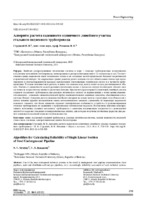Алгоритм расчета надежности единичного линейного участка стального подземного трубопровода

Date
2023Publisher
Another Title
Algorithm for Calculating Reliability of Single Linear Section of Steel Underground Pipeline
Bibliographic entry
Струцкий, Н. В. Алгоритм расчета надежности единичного линейного участка стального подземного трубопровода = Algorithm for Calculating Reliability of Single Linear Section of Steel Underground Pipeline / Н. В. Струцкий, В. Н. Романюк // Наука и техника. – 2023. – № 6. – С. 519-529.
Abstract
Наиболее распространенные технические системы в мире – стальные трубопроводные коммуникации в подземном исполнении (теплопроводы, магистральные и распределительные нефте- и газопроводы и пр.). Соответственно оценка надежности таких технических систем и их составных частей представляет большой теоретический и практический интерес. На современном уровне развития расчет надежности стал обязательным этапом при проектировании и диагностировании (в процессе эксплуатации) ответственных технических систем и в частности трубопроводных. В основе надежностного расчета, в явном или неявном виде, всегда лежит модель рассчитываемого объекта. Именно от адекватности модели реальным физическим связям и процессам внутри технического объекта зависят точность и практическая ценность расчетных методик. Предлагается рассматривать единичный линейный участок стального подземного трубопровода как сложную техническую систему из неравноценных с точки зрения надежности элементов – основного элемента (стальной трубы) и вспомогательных защитных элементов, объединенных в подсистемы (блоки). Алгоритм расчета надежности объекта построен на основе метода структурных схем (блок-схем) с учетом влияния эффекта последействия отказа вспомогательного элемента (элементов) на параметры надежности основного элемента, что более адекватно отражает специфические особенности устройства и функционирования стальных трубопроводов по сравнению с применяемыми статическими моделями. Рассмотрены варианты конструктивного исполнения стального подземного трубопровода с защитным изоляционным покрытием и с комплексной защитой от коррозии (изоляция и электрохимическая защита), для которых получены уточненные формулы для расчета основных показателей надежности (безотказности).
Abstract in another language
One of the most widespread technical systems in the world is underground steel pipeline communications (heat pipelines, main and distribution oil and gas pipelines, etc.). Accordingly, reliability assessment of such technical systems and their components is of great theoretical and practical interest. At the modern level of development, reliability calculation has become a mandatory stage in the design and diagnostics (during operation) of any technical systems in ge-neral, and in particular pipeline systems. A reliable calculation, either explicitly or implicitly, is always based on the model of the object being calculated. It is the adequacy of the model to the real physical relations and processes inside the technical object that determines the accuracy and practical value of calculation methods. It is proposed to consider a single linear section of an underground steel pipeline as a complex technical system of unequal elements from the point of view of reliability – the main element (steel pipe) and auxiliary protective elements combined into subsystems (blocks). The algorithm for calculating the reliability of the object is based on the method of block diagrams, taking into account the influence of the aftereffect of the failure of an auxiliary element (elements) on the reliability parameters of the main element, which more adequately reflects the specific features of the design and operation of steel pipelines compared with the applied static models. The variants of structural design of a steel underground gas pipeline with a protective insulation coating and with complex corrosion protection (insulation and electrochemical protection) are considered, for which refined formulas are obtained for calculating the main reliability (failure-free) indicators.
View/
Collections
- № 6[10]
